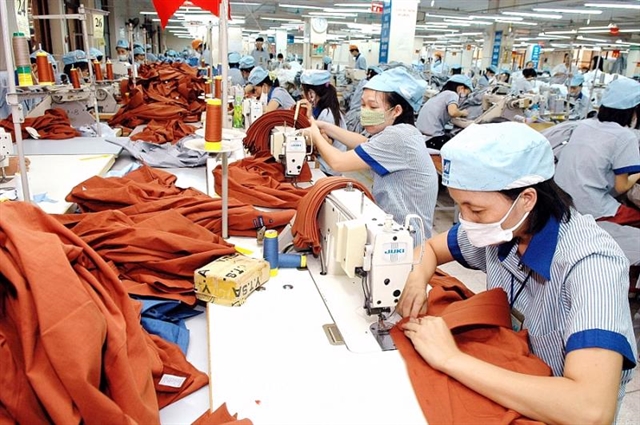
HÀ NỘI — The domestic textile and garment industry is likely to not reach its goals in production and business due to the strong impacts of the COVID-19 pandemic, according to the Việt Nam Textile and Apparel Association (Vitas).
The last three months of this year are considered to be an extremely difficult period for the textile industry, it said. Of which, the highest risk is supply chain disruption due to customers transferring orders to other markets.
Another important thing is the lack of human resources due to workers returning to their hometown to avoid the pandemic.
With the pandemic at present, the industry will find it very difficult to reach its export value target for this whole year at US$39 billion as in 2019.
There are three development scenarios for the domestic apparel industry this year, according to the association.
The most positive scenario is if Việt Nam controls the pandemic and enters the "new normal" situation from the beginning of October, the export value for this whole year is likely to reach about $37.5-38 billion.
In the second scenario, this export value is expected to reach about $36-36.5 billion if the pandemic continues, there are still some localities and industrial zones in lockdown or isolation until November.
The worst-case scenario is that the pandemic continues until early December 2021, in which the export value of the industry is expected to reach only $33.5-34 billion.
Next year, the textile and garment industry will strive to achieve an export turnover of $39-42 billion if the production and business situation returns to normal.
To remove current difficulties, it is necessary to closely coordinate between apparel enterprises and local authorities in implementing anti-pandemic plans and also production plans to reach the Government's dual goal of fighting the pandemic and recovering the domestic economic growth.
Meanwhile, enterprises must not let the supply chain of the apparel industry break. Besides that, they both implement safe production plans and support each other to fulfil unfinished orders.
On the other hand, the enterprises need to care about the employees who are still working, as well as those who take unpaid leave to return to their hometown due to the pandemic. That will prevent workers from quitting jobs at those enterprises and make them ready to go to work when the pandemic is over.
In addition, Vitas chairman Vũ Đức Giang said the enterprises also need support from the Government, ministries, sectors and localities to overcome the pandemic and realise the dual goals, especially vaccination for workers.
Vitas has suggested the State continuously reduce electricity prices and value-added tax by 20-30 per cent until the end of June 2022 for businesses in localities implementing social distancing measures under Directive 16.
Those localities should also not adjust land rents and even reduce the rent by 50 per cent until the end of June 2022 for the businesses.
According to the association, many enterprises in the southern provinces with the pandemic have implemented safe production plans, but they can only maintain jobs for about 10 per cent to 30 per cent of the workforce with much higher production costs than normal.
The apparel industry's export turnover in August decreased by 15.9 per cent month on month and 2.63 per cent year on year. This export value in September was estimated at $3 billion, continuing to decrease by 9.2 per cent month on month and 10.5 per cent year on year.
However, the industry still achieved a trade surplus of $11 billion in the first nine months of this year, of which the total export value grew by 13.2 per cent year on year to $29 billion.
The total import value of materials and accessories in the first nine months was estimated at $18 billion, up 27.9 per cent over the same period in 2020. — VNS